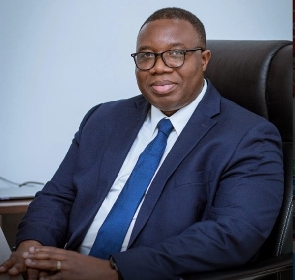 President of the Ghana Chamber of Mines, Joshua Mortoti
President of the Ghana Chamber of Mines, Joshua Mortoti
The Ghana Chamber of Mines, has stated that it is committed to working with stakeholders within the mining sector to ensure that the country gets the best out of the lithium deposits in the country for an inclusive and sustainable development.
Among other things, it is also pushing for a fiscal structure that treats mining inflows fairly.
In a statement, the chamber noted that when there is a fiscal structure, it will enhance sector growth and fortify the nation's economic position.
This call comes in response to recent concerns raised by stakeholders and institutions such as the Institute of Economic Affairs (IEA), about the benefits Ghana is getting from the agreement the government had with Barari DV Ghana Limited, a subsidiary of Atlantic Lithium in Australia to mine the mineral in Ewoyaa in the Central Region.
The President of the Chamber, Joshua Mortoti, suggests a reevaluation of the distribution of mining rents in the country.
He explained that such a review will support sectoral growth and ensure Ghana maximizes the benefits of the deal.
“We are pleased with the ongoing engagements among government, civil society, media, and the larger population. The Ghana Chamber of Mines wishes to assure the country of its unalloyed commitment to continue working with stakeholders to leverage the country’s mineral endowments for inclusive and sustainable development”, part of the statement read.
The Chamber of Mines also noted that it is unfortunate that some commentators on the agreement say that the sector is shortchanging the country.
The statement indicated that apart from the value that is retained in-country through employment and purchases from local suppliers, studies has shown that a more than proportionate share of mineral rents accrues to the government,
“Further, the Chamber finds it unfortunate that some commentators have inaccurately portrayed the mining sector as shortchanging the country in terms of the distribution of mineral rents.
“Apart from the significant value that is retained in-country through employment and purchases from local suppliers, a plethora of studies has shown that a more than proportionate share of mineral rents accrues to the government,” the statement continued.
“…For instance, a model by the Natural Resource Governance Institute (NRGI) suggests that the government’s share of mining rents is “just over 50%” which “falls comfortably within the 40% to 60%” profit-sharing ratio recommended by the International Monetary Fund (IMF) for mining countries.”
Below is the full release by the Ghana Chamber of Mines
Development of Ghana’s Lithium Resources
The Ghana Chamber of Mines has been following the national discussions on the mining lease for the Ewoyaa project with keen interest.
We are pleased with the ongoing engagements among government, civil society, media, and the larger population.
The Chamber lauds the Ministry of Lands and Natural Resources and Minerals Commission for their manifesto commitment to promoting constructive public discourse, inclusive development, and transparency.
In the same vein, we commend the civil society community for their important contributions to seeking a fair share of the benefits associated with the development of lithium resources for the country.
The conflation of the views of the different stakeholders is expected to enhance the outcomes of the project without hurting the country’s ability to attract requisite private capital to develop mineral endowments responsibly.
Accordingly, we urge circumspection in the discourse on the subject.
Further, the Chamber finds it unfortunate that some commentators have inaccurately portrayed the mining sector as shortchanging the country in terms of the distribution of mineral rents.
Apart from the significant value that is retained in-country through employment and purchases from local suppliers, a plethora of studies has shown that a more than proportionate share of mineral rents accrues to the government.
For instance, a model by the Natural Resource Governance Institute (NRGI) suggests that the government’s share of mining rents is “just over 50%” which “falls comfortably within the 40% to 60%” profit-sharing ratio recommended by the International Monetary Fund (IMF) for mining countries.
The Chamber recognizes that the current arrangement where some fiscal inflows from the mining sector are commingled with other taxes in the Consolidated Fund impedes the visibility of the developmental impact of the mining sector.
Against this backdrop, the Chamber has been advocating for the sequestration of fiscal payments by mining companies in a manner that is akin to the practice in the oil and gas sector.
More so, the Chamber has been championing the plough-back of a commensurate portion of mineral revenue to host communities in a timely manner to complement the voluntary corporate social investment initiatives of its member companies to enhance socio-economic development.
The Ghana Chamber of Mines wishes to assure the country of its unalloyed commitment to continue working with stakeholders to leverage the country’s mineral endowments for inclusive and sustainable development.
The development of mineral resources should lead to outcomes that are beneficial to both the host country and investors.
NW/MA
Watch the latest edition of BizTech below:
Click here to follow the GhanaWeb Business WhatsApp channel
Ghana’s leading digital news platform, GhanaWeb, in conjunction with the Korle-Bu Teaching Hospital, is embarking on an aggressive campaign which is geared towards ensuring that parliament passes comprehensive legislation to guide organ harvesting, organ donation, and organ transplantation in the country.